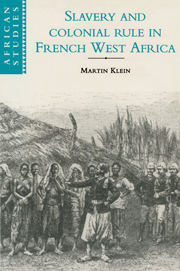Book contents
- Frontmatter
- Contents
- List of illustrations
- List of maps
- List of tables
- Preface
- List of abbreviations
- Glossary
- 1 Slavery in the Western Sudan
- 2 Abolition and retreat. Senegal 1848–1876
- 3 Slavery, slave-trading and social revolution
- 4 Senegal after Brière
- 5 Conquest of the Sudan: Desbordes to Archinard
- 6 Senegal in the 1890s
- 7 The end of the conquest
- 8 The imposition of metropolitan priorities on slavery
- 9 With smoke and mirrors: slavery and the conquest of Guinea
- 10 The Banamba Exodus
- 11 French fears and the limits to an emancipation policy
- 12 Looking for the tracks. How they did it
- 13 After the War: renegotiating social relations
- 14 A question of honor
- Appendixes
- Notes
- Bibliography
- Index
- Titles in the series
13 - After the War: renegotiating social relations
Published online by Cambridge University Press: 07 May 2010
- Frontmatter
- Contents
- List of illustrations
- List of maps
- List of tables
- Preface
- List of abbreviations
- Glossary
- 1 Slavery in the Western Sudan
- 2 Abolition and retreat. Senegal 1848–1876
- 3 Slavery, slave-trading and social revolution
- 4 Senegal after Brière
- 5 Conquest of the Sudan: Desbordes to Archinard
- 6 Senegal in the 1890s
- 7 The end of the conquest
- 8 The imposition of metropolitan priorities on slavery
- 9 With smoke and mirrors: slavery and the conquest of Guinea
- 10 The Banamba Exodus
- 11 French fears and the limits to an emancipation policy
- 12 Looking for the tracks. How they did it
- 13 After the War: renegotiating social relations
- 14 A question of honor
- Appendixes
- Notes
- Bibliography
- Index
- Titles in the series
Summary
… Everyone was free to go where they wished. Now it was each person for himself. Few remained because masters did not give enough help to slaves. But those who set themselves up close by continued to come and greet their master every morning. Nevertheless, the word slave no longer remained.
Ex-slave informant, SenegalFor the slaves, the most important thing about World War I was that an army of African slaves went forth once more to serve France, this time on the battlefields of Europe. While the war shifted colonial policy in a more authoritarian direction, its most immediate result was another movement of liberation. The First World War impacted on slavery because a largely slave army was conscripted to fight it. Many years later, after another war, a colonial governor suggested that the Fulbe of Futa Jallon contributed to the emancipation of the slaves by always choosing them when the colonial state demanded men. In this, the Futa Fulbe were not unique. The demand by the colonial state for soldiers led to a significant erosion of the masters’ hegemonic position in many areas. From the first, during the nineteenth century, those who served in the French army used that service to break the chains of previous servitude. If they returned to places where they had been slaves, it was to liberate relatives. Sometimes these relatives were not eager to follow long-lost brothers or sons, to discover unknown fathers, or to throw off husbands to join earlier mates; but others followed ex-tirailleur kin to new communities, often in or near French posts.
- Type
- Chapter
- Information
- Slavery and Colonial Rule in French West Africa , pp. 216 - 236Publisher: Cambridge University PressPrint publication year: 1998

